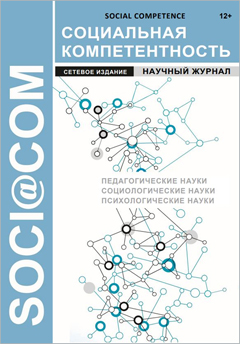Visualising Abstract Knowledge in the Process of Teaching Philosop
DOI:
https://doi.org/10.24866/2658-5855/2023-3/5-13Keywords:
teaching philosophy in higher education, methods of teaching philosophy, transcendentality of philosophy, synthesis of philosophy, cultural studies and logic, visualization of a philosophical text, logical and mathematical techniques for constructing a textAbstract
The article is devoted to describing the experience of using information technologies in the process of teaching the humanities. Philosophy is the most difficult to master due to the high level of abstraction of the categorical apparatus. To convey extremely abstract categories requires an in-depth understanding of philosophical issues, built on critical analysis. The process of studying philosophy leads to the search for new techniques. One such productive technique is the visualization of a philosophical text. Visualization helps to establish the essential characteristics of philosophical concepts and discover not only a close dialectical connection between them, but also to build relationships between various disciplines studied at the university, such as philosophy, cultural studies, mathematics, logic, computer science. Motivating non-philosophical students for the creative process of creating visual images contributes to a deeper study of philosophical texts.
Downloads
References
Заир-Бек С.И., Муштавинская И.В. Развитие критического мышления на уроке: пособие для учителей общеобразовательных учреждений. Москва: Просвещение, 2011. 223 с. Zair-Bek S.I., Mushtavinskaya I.V. Тhe Development of Critical Thinking in the Lesson: a Manual for Teachers of General Education. Moscow, Prosveshhenie Publ., 2011. 223 p. (In Russ.).
Климова Т. В. Оценка педагогических условий формирования критического мышления студента (на примере естественнонаучных специальностей ОГУ) // Вестник Оренбургского государственного университета. 2012. № 1(137). С. 4–9. EDN: OYDFRL Klimova T.V. Evaluation of Teaching Conditions of Critical Thinking of Students (on the Example of Natural Specialties OSU). Vestnik of the Orenburg State University, 2012, no. 1(137), pp. 4–9. (In Russ.).
Загашев И.О., Заир-Бек С.И. Критическое мышление: технология развития. Санкт-Петербург: Альянс «Дельта», 2003. 284 с. Zagashev I.O., Zair-Bek S.I. Critical Thinking: Technology Development. Saint Petersburg, Alliance “Delta” Publ., 2003. 384 p. (In Russ.).
Лукина И.Н. Технология развития критического мышления как средство реализации профессиональной компетентности // Философия образования. 2012. № 4(43). С. 29–34. EDN: PCMORT Lukina I.N. The Technology of the Critical Thinking Development as a Means of the Professional Competence Realization. Philosophy of Education, 2012, no. 4(43), pp. 29–34. (In Russ.).
Ольховая Т.А., Елисеев В.Н. Критическое мышление как основа развития информационно-познавательной самостоятельности студентов // Высшее образование сегодня. 2013. № 9. С. 46–51. EDN: RIUANB Olkhovaya T.A., Yeliseyev V.N. Critical Thinking as the Basis for the Development of Students' Informational and Cognitive Independence. Vyssheye obrazovaniye segodnya, 2013, no. 9, pp. 46–51. (In Russ.).
Сапух Т.В. Формирование опыта интерактивного взамодействия на основе технологии развития критического мышления // Интеллект. Инновации. Инвестиции. 2013. Спецвыпуск. С. 116–120. Sapukh T.V. Formation of Interaction Experience Based on Critical Thinking Developing Technology. Intelligence. Innovation. Investments, 2014, Special Issue, pp. 116–120. (In Russ.).
Преснякова Т.Н. Проблема реализации межпредметных связей в процессе преподавания гуманитарных дисциплин в вузе // Литература и культура Дальнего Востока и Восточного зарубежья: проблемы межкультурной коммуникации: Материалы участников V Всероссийской научно–практической конференции с международным участием. Владивосток: Дальневосточный федеральный университет, 2015. С. 62–67. Presnyakova T.N. The problem of the Implementation of Intersubject Communications in the Process of Teaching Humanities at a University. Literature and Culture of the Far East and Eastern Countries: Problems of Intercultural Communication: Proc. of V All-Russ. Sci. Conf. Vladivostok, Far Eastern Federal University Publ., 2015, pp. 62–67. (In Russ.).
Ананьев Б.Г., Дворяшина М.Д., Кудрявцева Н.А. Индивидуальное развитие человека и константность восприятия. Москва: Просвещение, 1968. 332 с. Anan'ev B.G., Dvoryashina M.D., Kudryavtseva N.A. Individual Human Development and Constancy of Perception. Moscow, Prosveshchenie Publ., 1968. 332 p. (In Russ.).
Зинченко В.П. Образ и деятельность. Москва: Институт практической психологии, 1997. 608 с. Zinchenko V.P. Image and Activity. Moscow, Institute of Practical Psychology Publ., 1997. 608 p. (In Russ.).
Пивоваров Д.В. Основные категории онтологии. Екатеринбург: Изд-во Уральского гос. ун-та, 2003. 268 с. Pivovarov D.V. Main Categories of Ontology. Ekaterinburg, Publishing House of the Ural State University, 2003. 268 p. (In Russ.).
Попова Т.И., Колесова Д.В. Визуализация информации как тенденция развития современного текста // Медиалингвистика. 2015. № 4(10). С. 83–94. EDN: VCFQBT Popova T.I., Kolesova D.V. Visualization of Information as the Modern Text Development Trend. Media Linguistics, 2015, no. 4(10), pp. 83–94. (In Russ.).
Ладенко И.С. Интеллект и логика. Красноярск: Изд-во Красноярск. ун-та, 1985. 144 с. Ladenko I.S. Intelligence and Logic. Krasnoyarsk, Krasnoyarsk University Publishing House, 1985. 144 p. (In Russ.).
Каган М.С. Философия культуры. Санкт-Петербург: Петрополис, 1996. 416 с. Kagan M.S. Philosophy of Culture. Saint Petersburg, Petropolis Publ., 1996. 416 p. (In Russ.).
Downloads
Published
Issue
Section
License
Copyright (c) 2024 Татьяна Николаевна Преснякова, Ирина Анатольевна Непочатых

This work is licensed under a Creative Commons Attribution-NonCommercial-NoDerivatives 4.0 International License.


